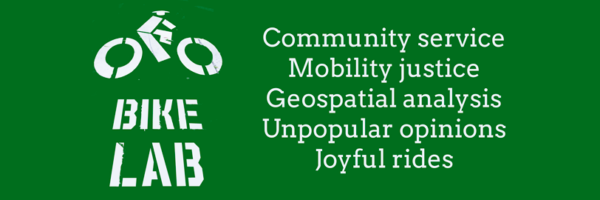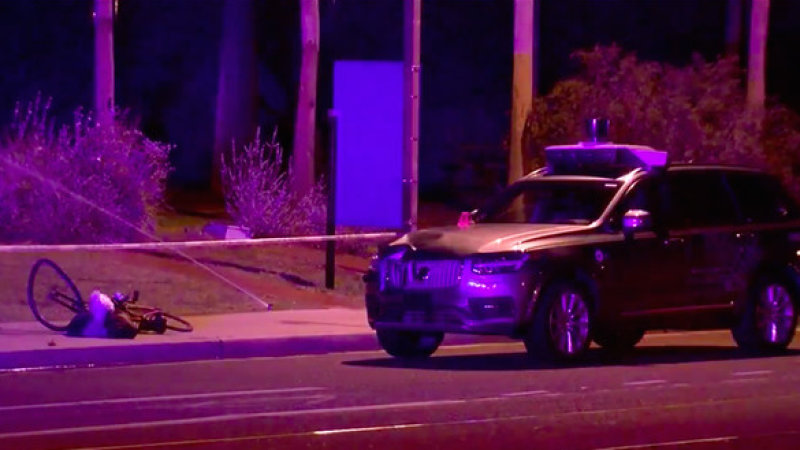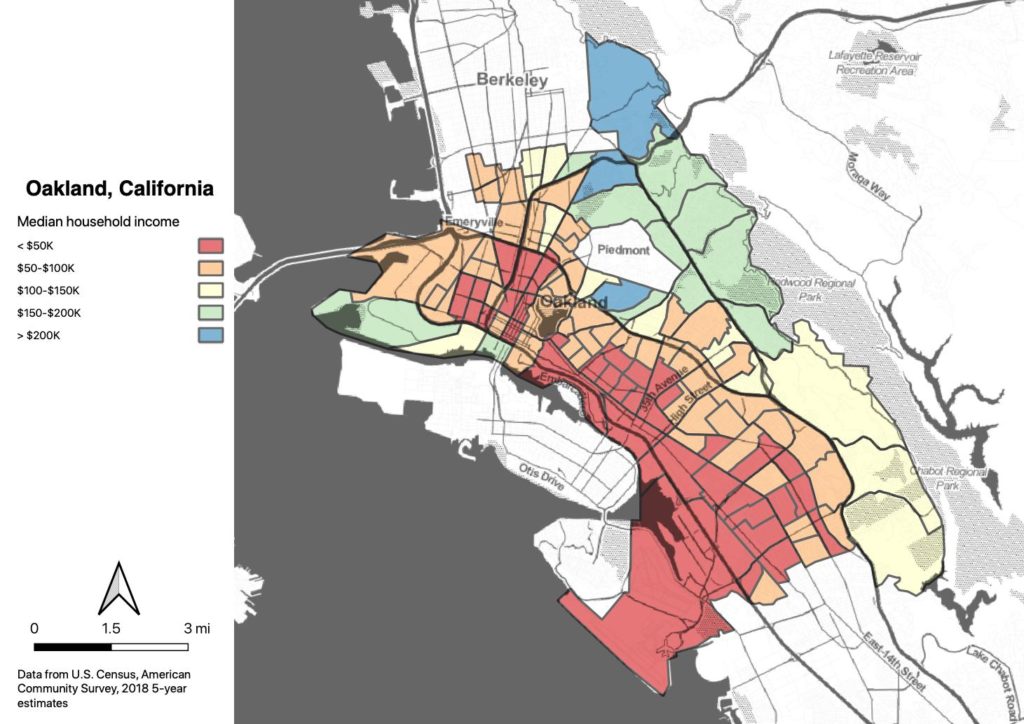I was hoping to be able to post today about the Mobility4All panel discussion scheduled for this past Sunday, sponsored by Rich City Rides and featuring cycling justice superstar Adonia Lugo. Unfortunately Lugo had to cancel because of an illness, so I’ll instead talk about an interaction I had last week which connects with her work.
First, everyone who’s involved in cycling advocacy, especially in places like the Bay Area where advocacy has become powerful, must take the time to read and understand Lugo’s Unsolicited Advice for Vision Zero, which challenges advocates to think about how their behaviors contribute to the identification of bike infrastructure with whiteness. (Lugo’s new book, Bicycle/Race, is also likely to be fascinating; I had been planning to pick up a copy at this weekend’s event).
Bike East Bay’s current focus is the creation of more protected bike lanes. In Oakland we have basically one of these so far, a parking-protected lane through Uptown/KONO on Telegraph Avenue. It’s pretty controversial, and I’d personally say, not very successful. This is where Libby Schaaf and I had to squeeze through double-parked cars on Bike to Work Day, a common experience in those lanes. But, some people think the lane is OK, and it’s often referred to by advocates as an example they’re trying to replicate elsewhere.
The current effort is to create similar lanes further up Telegraph. I wrote about the outreach process for this project earlier. I felt it was handled somewhat disingenuously, more of a marketing campaign than true community engagement, and it didn’t seriously offer opportunities for public commentary.
Upset over the existing Telegraph lanes, and this process for deciding on the new design, came to a head at November’s Bicycle and Pedestrian Advisory Commission meeting, when a community member spoke out strongly against the protected design, and commissioner Mariana Parreiras introduced a motion to have BPAC send a memo to City Council formally opposing the design. The motion failed, with three yes votes and three abstentions. (It needed five yes votes to pass).
Opposing the project would have been a very unusual thing for BPAC to do. Advocates, BPAC, and bike program staff within the city have generally been strongly aligned, as they are in many U.S. cities. Criticism is discouraged. Even academic research from folks such as super-wonk Jennifer Dill struggles to fully question its own set of values and assumptions about cycling, infrastructure and design.
The problem of insular thinking in bike advocacy was highlighted by this Twitter conversation involving longtime Oakland bike advocate Robert Prinz, currently Bike East Bay’s Education Director.
https://twitter.com/prinzrob/status/1065375816899383296
The Bike Lab doesn’t focus on infrastructure debates, because I think advocates spend way too much time focusing on it already. But I am interested in promoting inclusive processes, and this situation connects with many of the points about process that Lugo makes in her Unsolicited Advice article.
Lugo sees:
…a developing intercity competition where bike advocates try to get politicians on board with their projects by naming the other cities that are supporting it. These three tendencies within bike advocacy draw attention away from local community realities and have helped turn bike projects into symbols of gentrification and change imposed without local input.
I’ll note that Oakland has not adopted Vision Zero, in part because of numerous people here (including Prinz) who share Lugo’s concern about the risks of advocating for increased law enforcement in an environment of racially-biased policing. But the rest of her point is on-target; for many years the vast majority of funding and effort has gone towards central planning and engineering solutions. Community input is often viewed as an impediment to implementation of the centrally-planned vision.
Or as Twitter commentator Dragonfly put it:
https://twitter.com/Dragon_FLY_on/status/1065474374696763392
Now, Bike East Bay these days is not predominantly composed of white guys, but its infrastructure plans are still rooted in Northern European visions of how public space should be designed and used. We need to grapple with the fact that that vision is not culturally neutral.
Lugo again:
Bike advocates tend to see themselves as an embattled minority, to the point of leaving little room for diversity of experience and opinions within their own ranks. It’s led to a lot of acrimonious infighting in the bike movement, such as the longstanding debate about vehicular cycling. I heard this defensiveness in the Vision Zero presentation as Shahum called VZ “the only ethical choice.” I’m guessing that this suggestion that disagreement with Vision Zero makes one unethical was designed to shame politicians, but I’d urge Vision Zero strategists to consider what silencing effects a combative tone might have on participation by oppressed groups.
In the Twitter conversation, Prinz characterized Parreiras’ motion as “obstructionism,” her concerns about the safety of the design as, “the typical stuff VCs [vehicular cyclists] don’t like about cycletracks,” and my points about the outreach process as “bashing.” He framed his advocacy in moral terms, noting that a pedestrian was killed on this stretch of road in 2014 and thus we must implement the design that he thinks is the safest.
A commenter from New York opined, “Amazing how little empathy and vision vehicular cyclist zealots have. Boot them off the board and replace them with moms who bike with kids.”
Both Parreiras and Burnette Jr. (RB, of the Scraper Bike Team) are people of color. I don’t know if Parreiras is a mother, but she rides a city bike and gives out homemade handlebar streamers at community bike events. Neither appears to be a “vehicular cyclist zealot” in the mold of John Forester.
There’s a sense in which Prinz is just doing what he views as his job, which is to advocate for cycling safety. But I would challenge all advocates to heed Lugo’s unsolicited advice, and think about how adopting absolutist and moralistic positions about how we accomplish our work can lead to conflicts and exclusions, particularly for those whose cultural backgrounds aren’t rooted in Northern Europe.


